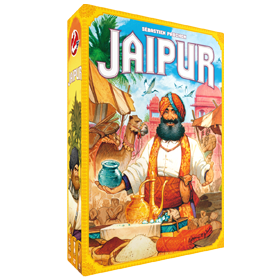Jaipur
 Jaipur... You are hoping to become the Maharaja’s personal trader by being richer than your opponent at the end of each week (round).
Jaipur... You are hoping to become the Maharaja’s personal trader by being richer than your opponent at the end of each week (round).
To do so, collect and exchange goods at the market, then sell them for rupees. If you manage to put together a really good deal, then you’ll receive an extra reward!
Number of players: 2
Game duration: 12 mn
Complexity: 2 / 5
Play Jaipur and 988 other games online.
No download necessary - play directly from your web browser.
With your friends and thousands of players from the whole world.
Free.

Play Jaipur and 988 other games online.
No download necessary - play directly from your web browser.
With your friends and thousands of players from the whole world.
Free.

Rules summary
For tips on how to play jaipur, see Tips_jaipur
Overview
- In Jaipur, each player has a hand of cards with various (colour-coded) goods on them. At the start of the game, each player is dealt a 5 cards. The hand-limit is 7 cards.
- Each player may also have camel cards (their "herd") which is not considered part of their hand. Camel cards are placed in a pile face-up in front of each player.
- There are five cards face-up between the players that are available for the players to take or trade. At the start of the game, these 5 cards consist of 3 camel cards plus two from the deck.
There are 55 goods cards:
- Diamonds x6
- Gold x6
- Silver x6
- Cloth x8
- Spice x8
- Leather x10
- Camels x11
There are 18 bonus tokens:
- 3 sale bonus tokens: 1, 1, 2, 2, 2, 3, 3
- 4 sale bonus tokens: 4, 4, 5, 5, 6, 6
- 5 sale bonus tokens: 8, 8, 9, 10, 10
Actions
On your turn, you take one of three actions:
- Take a single card or all the camels in the face up row.
- You may take any single goods card from the card row and add it to your hand, or take all the camels in the row and add them to your herd.
- You are limited to having 7 goods cards in your hand, so you may not take a goods card if you already have 7 goods cards in your hand. (Again, your herd does not count toward this limit.)
- The card row is then replenished from the deck so it always has 5 cards at the start of a turn.
- Trade for 2 or more goods cards from the row.
- You may trade goods cards from your hand or camels from your herd for goods cards from the card row. For every one card you trade from your hand or herd, you may pick up one goods card from the row and add it to your hand.
- The goods cards you trade must be of a different type from those you take from the card row. (For example, trading a Silk and a Spice for a Silk and a Gold would not be permitted)
- The cards you traded are added to the card row, so it will still have 5 cards.
- Sell cards to earn points.
- You may sell one or more cards to earn points, but all the cards you sell must be the same colour.
- If you are selling Diamonds, Gold, or Silver (the red, yellow, and grey cards) you MUST sell at least two cards.
- Regardless of the type of good, each card you sell lets you take one token of the corresponding colour from the bank, starting from the most valuable token.
- If you sell 3 or more goods, you also earn a bonus token from the corresponding pile (for sales of 3,4, or 5+ goods).
- The sold goods cards are discarded.
Round End
The game continues until either:
- Three piles of goods tokens are depleted; OR
- The card row cannot be replenished.
At this point, players total the points they have on their earned goods tokens and bonus tokens.
- In addition, whichever player has more camels in their herd at the end of the round earns the camel bonus token, worth 5 points.
- Whichever player earns more points total wins the round.
- After the round, the game resets and new hands are dealt.
Tie-breaks
- The most bonus tokens
- The most goods tokens
Game End
The first player to win two rounds wins the game.



